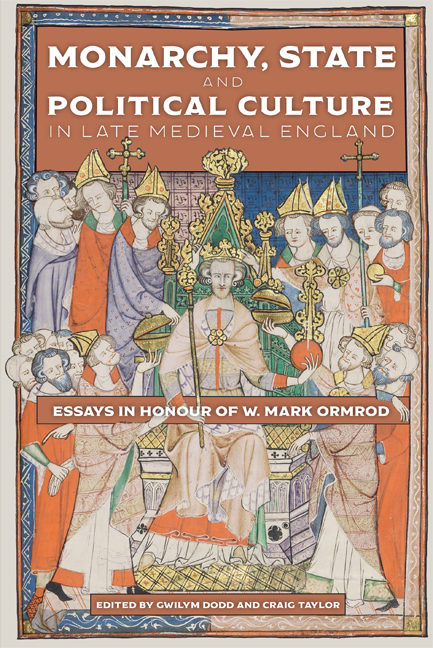Book contents
- Frontmatter
- Contents
- Frontispiece
- Preface and Acknowledgements
- Contributors
- Abbreviations
- Professor W. Mark Ormrod: A Personal Appreciation
- 1 The ‘Unfortunate’ Fraudster: Thomas de Boulton and the East Riding Lay Subsidy of 1332
- 2 Negotiating and Creating Collegiate Statutes in the Fourteenth Century
- 3 An Emotional Pragmatism: Edward III and Death
- 4 Defaming the King: Reporting Disloyal Speech in Fourteenth-Century England
- 5 Law and Arms: The Politics of Chivalry in Late Medieval England
- 6 ‘Nother by Addicions, Nother by Diminucions’: The Parliament of April 1414 and the Drafting of Late Medieval English Legislation
- 7 The Medieval ‘Side-Hustler’: Thomas Hoccleve’s Career in, and out of, the Privy Seal
- 8 The Order, Rules and Constructions of the House of the Most Excellent Princess Cecily, Duchess of York
- 9 Archbishops’ Registers Revealed: Church, State and Society in the Registers of the Archbishops of York, 1225–c.1650
- List of PhD Supervisees
- List of Grants
- Index
- Tabula Gratulatoria
4 - Defaming the King: Reporting Disloyal Speech in Fourteenth-Century England
Published online by Cambridge University Press: 06 October 2020
- Frontmatter
- Contents
- Frontispiece
- Preface and Acknowledgements
- Contributors
- Abbreviations
- Professor W. Mark Ormrod: A Personal Appreciation
- 1 The ‘Unfortunate’ Fraudster: Thomas de Boulton and the East Riding Lay Subsidy of 1332
- 2 Negotiating and Creating Collegiate Statutes in the Fourteenth Century
- 3 An Emotional Pragmatism: Edward III and Death
- 4 Defaming the King: Reporting Disloyal Speech in Fourteenth-Century England
- 5 Law and Arms: The Politics of Chivalry in Late Medieval England
- 6 ‘Nother by Addicions, Nother by Diminucions’: The Parliament of April 1414 and the Drafting of Late Medieval English Legislation
- 7 The Medieval ‘Side-Hustler’: Thomas Hoccleve’s Career in, and out of, the Privy Seal
- 8 The Order, Rules and Constructions of the House of the Most Excellent Princess Cecily, Duchess of York
- 9 Archbishops’ Registers Revealed: Church, State and Society in the Registers of the Archbishops of York, 1225–c.1650
- List of PhD Supervisees
- List of Grants
- Index
- Tabula Gratulatoria
Summary
THIS STUDY EXAMINES THE EXTENT TO which disloyal speech was tolerated in fourteenth-century England. As people outside the elite increasingly conceived of themselves as royal subjects, some of them voiced criticism of those in power, whilst others reported their neighbours for defamatory political gossip. In all probability this kind of speech was not entirely new, but it was in this period that it began to be reported and recorded. Scholarship in this area has tended to focus on the fifteenth century and later; the fourteenth-century cases under discussion here are rarer, but a number of examples do survive in which people were alleged to have spoken defamatory words against the king or criticised royal government. These cases offer insight into the way in which people understood and internalised the role of subjects in fourteenth-century England. Conceptions of what it meant to be a subject can be found in a range of different textual genres: governmental texts, including the opening sermons of parliament, outlaw ballads and satirical poems, petitions, letters and chronicles, all invoked the idea of subjecthood in strategic ways. However, this study focuses on the reported speech of subjects themselves. These cases involved a complex matrix of ideas drawn from legal concepts of defamation, slander, conspiracy, rebellion and treason. Those involved tested the boundaries of acceptable speech and, crucially, the extent to which communities would tolerate dissent. Ultimately, these cases survive for us because people reported them. Thus, it is clear that royal government formulated and enforced laws on ‘political’ speech in the law courts, but wider social norms also evolved to self-police speech within local communities.
One of the defining features of fourteenth-century England was the ‘growth of government’. Whether through paying taxes, witnessing royal events, serving in or supplying armies, sitting on juries or holding minor royal offices, more people directly experienced their status as royal subjects than ever before. Mark Ormrod's 1995 publication Political Life in Medieval England set out the parameters of this interaction with royal government, and his work influenced a generation of historians interested in understanding the experiences of royal subjects. In the last twenty years, further research into the political life of non-elites in later medieval England has shed new light on concepts of public opinion and the formation of more integrated and articulate political communities.
- Type
- Chapter
- Information
- Monarchy, State and Political Culture in Late Medieval EnglandEssays in Honour of W. Mark Ormrod, pp. 71 - 93Publisher: Boydell & BrewerPrint publication year: 2020



